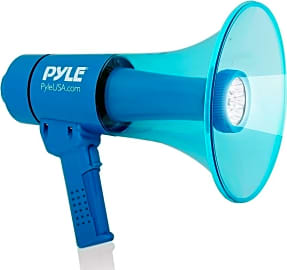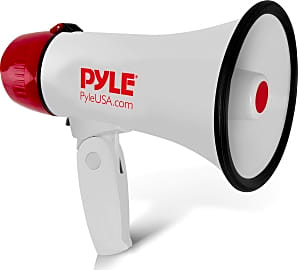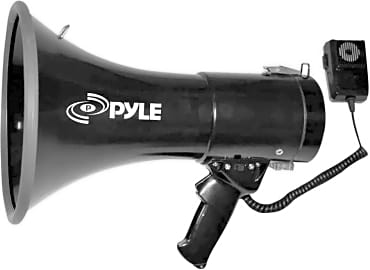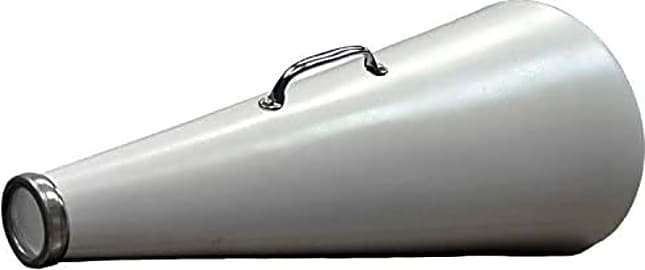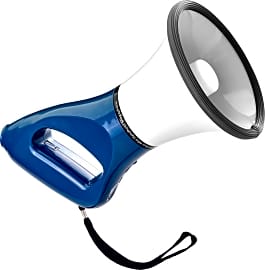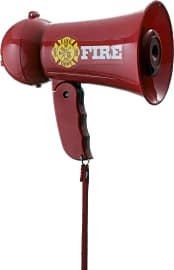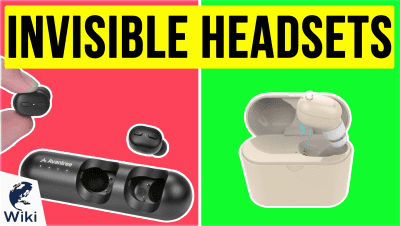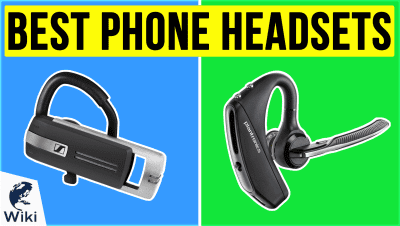The 8 Best Megaphones

This wiki has been updated 47 times since it was first published in June of 2015. Whether you're directing traffic, organizing a demonstration on the street, or training a football team on the field, one of these powerful megaphones will definitely come in handy when you need to be heard. We've included a variety of models suitable for indoor gatherings and larger outdoor activities, along with some formidable monsters capable of projecting your voice thousands of yards away. When users buy our independently chosen editorial choices, we may earn commissions to help fund the Wiki.
Editor's Notes
March 23, 2021:
We removed the Kestrel Blue Ocean and MyMealivos Professional during this update due to availability issues.
New to the list, the Pyle Bullhorn is a good choice for someone who wants more features than a simple model like the Pyle Speaker can offer but doesn't want to pay extra for all the bells and whistles of the Pyle PA. It has a handheld mic, a built-in siren, and an aux port that can be used to stream audio from devices like smartphones and mp3 players.
We also decided to add an electricity-free option in this update: the Rise Aquatics Plastic. Whether you want something that can survive being dropped or you don't want to have to keep buying batteries, this simple model can be a good choice. Unfortunately, it doesn't provide as much amplification as powered alternatives.
February 17, 2020:
We added five new entries during this update, removing three that we found to have questionable quality and availability issues.
Our new top pick overall, the Pyle PA, is one of those new additions. Brought in to replace the outdated Pyle Bullhorn as our Bluetooth option, the Pyle PA has all the tech connectivity features you want, while at the same time being an affordable, solidly built megaphone.
Pyle continues to dominate the market by making reliable audio products like this, and I really don't see them getting knocked off the #1 spot any time soon.
Another Pyle we added was the Pyle Speaker. This compact option has an almost unbelievably low price tag, but still packs a punch with 20 watts of power. Similarly-priced products are almost certainly going to be of lower quality, so if you’re looking for something on a budget, the Pyle Speaker is exactly what you need.
To beef up our list with some more power, we also added the Thunderpower 1200. It’s big, bulky, and expensive, but if you want to be absolutely sure people are going to hear you, it’s going to do the job.
A really interesting model we came across during our research was the MyMealivos Professional. Its voice-recording feature allows you to store a message up to 15 seconds long that, by pressing a button, will replay through the megaphone. I’m sure there are many users who find themselves repeating the same announcement or reminder over and over, and would love to automate the process with a feature like this.
I'm Picking Up Good Vibrations
At any level of power, simply increasing the surface area of a vibrating source will magnify its ability to travel across space.
You may be aware that sound is a matter of vibration. Think of it as a minor atmospheric disturbance caused by the transfer of energy from one object in space to its surrounding environment.
If we dig a little deeper, though, another question presents itself: What makes it possible for one thing in an environment to transmit energy as sound?
The answer will likely break down your understanding of physics and the universe as you know it, so, get ready.
At the core of it all, of everything, is vibration. At the atomic level or the quantum level, this is a basic idea, and it's why those new age types are so keen on feeling your vibrations.
The reason you can put your hand through water and not through wood is that the atomic structure of wood operates at a higher vibrational frequency than your hand, and your hand operates at a higher vibrational frequency than the water.
Of course, these vibrations are measured in conjunction with the variable of time, which is why water can, eventually and under the right circumstances, permeate wood and even stone.
When we accept that time and space are essentially the same thing that is simply measured in two ways, we can see why a more powerful megaphone is needed to amplify the vibration of your voice enough to permeate a greater distance. It'd be like increasing the water pressure in an aquifer.
At any level of power, simply increasing the surface area of a vibrating source will magnify its ability to travel across space. It will seem louder and travel farther.
When you add the kinds of drivers to the mix that megaphones use (those are the little cylindrical pieces in the middle of the cone), the megaphone becomes a tripartite source: Mouth, driver, cone.
The more powerful the driver, and the bigger the cone, the greater your voice will carry.
A Megaton Of Options
At first glance, it might be hard to see any real difference between one megaphone and the next. They're all shaped basically the same, with a little removable handheld microphone, a long bell, and a handle.
Similarities, while reassuring to a certain extent, can make a product decision more difficult for lack of real comparability.
Fortunately for you, we've gone ahead and taken a lot of the sting out of your search by presenting you with the cream of the crop. You don't want all the cream, though, just a good spoonful.
At first glance, it might be hard to see any real difference between one megaphone and the next.
Well, what's your taste in cream? Leaving the metaphor aside, what are you going to use your megaphone to accomplish?
Are you rallying fellow students in a crowded and boisterous gymnasium? Perhaps you're speaking truth to power at an Occupy rally wherever they might still be happening. In noisy, crowded areas, you're going to want as much power and are coverage as you can get.
Think of every other object in space as a potential impediment to the journey of your sound waves. Every fellow student or protestor, every colorful sign or well-made banner will dampen your efforts to reach the masses. You want a powerful driver and a big cone.
If this is a purchase meant for smaller venues and more amenable crowds, like keeping the kids in line as they prepare for a school day, a smaller megaphone would do you just fine.
There's also the possibility that you want to use your megaphone as a music player by hooking up your phone or MP3 player to it. Well, first of all, make sure that you can do that with the model you're eying, then check to see if it creates a clear enough sound to satisfy your tastes.
Binoculars For The Ears
There's some bit of controversy surrounding the actual invention of the megaphone as we know it today, and early designs were as much for hearing from great distances as they were for projecting one's voice. They were like binoculars, or telescopes, but for the ears.
Since then, electric models have come to dominance in every arena save the cheer-leading floor.
You might remember seeing images of Beethoven, who, sadly, went progressively deaf as he aged, operating a small, coiled hearing device that looked like a miniature version of the speaker on an old record player.
These early hearing aides were smaller versions of the first megaphones, which were meant to send as well as receive, a feat made possible by the fact that they weren't electric. It was a simple trick of acoustic physics.
The first developments of those acoustic megaphones reach back into the 17th century, with Edison coming along some 200 years later to advance the design.
In the 1970s, much like Bob Dylan a few years prior, megaphones went electric. Since then, electric models have come to dominance in every arena save the cheer-leading floor. They've gotten more powerful with time, but they have also, for better or worse, lost their ability to receive.



